#capita federal
Text

Four years ago today (March 13th), then President Donald Trump got around to declaring a national state of emergency for the COVID-19 pandemic. The administration had been downplaying the danger to the United States for 51 days since the first US infection was confirmed on January 22nd.
From an ABC News article dated 25 February 2020...
CDC warns Americans of 'significant disruption' from coronavirus
Until now, health officials said they'd hoped to prevent community spread in the United States. But following community transmissions in Italy, Iran and South Korea, health officials believe the virus may not be able to be contained at the border and that Americans should prepare for a "significant disruption."
This comes in contrast to statements from the Trump administration. Acting Department of Homeland Security Secretary Chad Wolf said Tuesday the threat to the United States from coronavirus "remains low," despite the White House seeking $1.25 billion in emergency funding to combat the virus. Larry Kudlow, director of the National Economic Council, told CNBC’s Kelly Evans on “The Exchange” Tuesday evening, "We have contained the virus very well here in the U.S."
[ ... ]
House Speaker Nancy Pelosi called the request "long overdue and completely inadequate to the scale of this emergency." She also accused President Trump of leaving "critical positions in charge of managing pandemics at the National Security Council and the Department of Homeland Security vacant."
"The president's most recent budget called for slashing funding for the Centers for Disease Control, which is on the front lines of this emergency. And now, he is compounding our vulnerabilities by seeking to ransack funds still needed to keep Ebola in check," Pelosi said in a statement Tuesday morning. "Our state and local governments need serious funding to be ready to respond effectively to any outbreak in the United States. The president should not be raiding money that Congress has appropriated for other life-or-death public health priorities."
She added that lawmakers in the House of Representatives "will swiftly advance a strong, strategic funding package that fully addresses the scale and seriousness of this public health crisis."
Senate Minority Leader Chuck Schumer also called the Trump administration's request "too little too late."
"That President Trump is trying to steal funds dedicated to fight Ebola -- which is still considered an epidemic in the Democratic Republic of the Congo -- is indicative of his towering incompetence and further proof that he and his administration aren't taking the coronavirus crisis as seriously as they need to be," Schumer said in a statement.
A reminder that Trump had been leaving many positions vacant – part of a Republican strategy to undermine the federal government.
Here's a picture from that ABC piece from a nearly empty restaurant in San Francisco's Chinatown. The screen displays a Trump tweet still downplaying COVID-19 with him seeming more concerned about the effect of the Dow Jones on his re-election bid.

People were not buying Trump's claims but they were buying PPE.
I took this picture at CVS on February 26th that year.
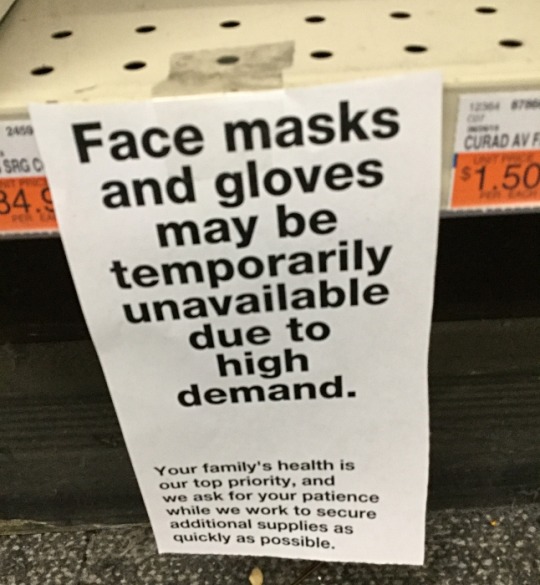
The stock market which Trump in his February tweet claimed looked "very good" was tanking on March 12th – the day before his state of emergency declaration.
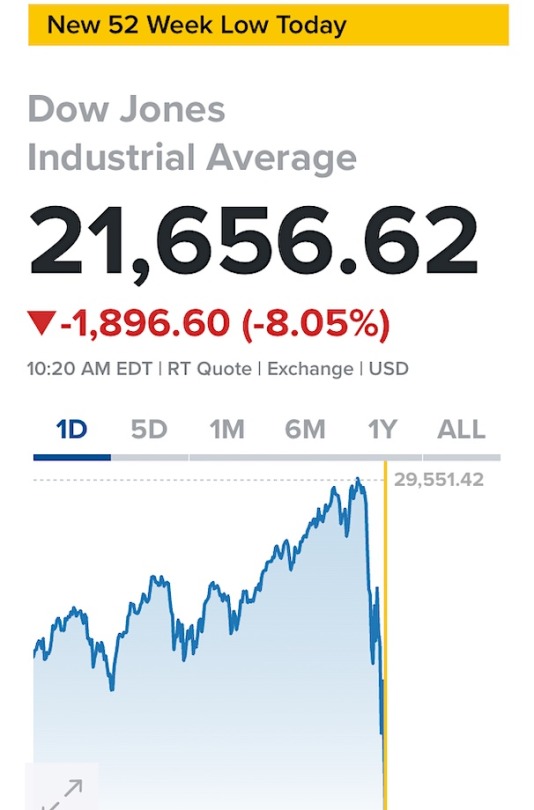
Trump succeeded in sending the US economy into recession much faster than George W. Bush did at the end of his term – quite a feat!. (As an aside, every recession in the US since 1981 has been triggered by Republican presidents.)
Of course Trump never stopped trying to downplay the pandemic nor did he ever take responsibility for it. The US ended up with the highest per capita death rate of any technologically advanced country.
Precious time was lost while Trump dawdled. Orange on this map indicates COVID infections while red indicates COVID deaths. At the time Trump declared a state of emergency, the virus had already spread to 49 states.

The United States could have done far better and it had the tools to do so.
The Obama administration had limited the number of US cases of Ebola to under one dozen during that pandemic in the 2010s. Based on their success, they compiled a guide on how the federal government could limit future pandemics.
Obama team left pandemic playbook for Trump administration, officials confirm
Of course Trump ignored it.
Unlike those boxes of nuclear secrets in Trump's bathroom, the Obama pandemic limitation document is not classified. Anybody can read it – even if Trump didn't. This copy comes from the Stanford University Libraries.
TOWARDS EPIDEMIC PREDICTION: FEDERAL EFFORTS AND OPPORTUNITIES IN OUTBREAK MODELING
Feel free to share this post with anybody who still feels nostalgic about the Trump White House years!
#covid-19#coronavirus#pandemic#public health#donald trump#trump's incompetent response to the pandemic#covid state of emergency#2020#trump recession#51 days of trump pandemic dawdling#obama pandemic playbook#2010s ebola outbreak#nostalgia for trump administration#republicans#election 2024#vote blue no matter who
109 notes
·
View notes
Text

Supreme Court poised to appoint federal judges to run the US economy.
January 18, 2024
ROBERT B. HUBBELL
JAN 17, 2024
The Supreme Court heard oral argument on two cases that provide the Court with the opportunity to overturn the “Chevron deference doctrine.” Based on comments from the Justices, it seems likely that the justices will overturn judicial precedent that has been settled for forty years. If they do, their decision will reshape the balance of power between the three branches of government by appointing federal judges as regulators of the world’s largest economy, supplanting the expertise of federal agencies (a.k.a. the “administrative state”).
Although the Chevron doctrine seems like an arcane area of the law, it strikes at the heart of the US economy. If the Court were to invalidate the doctrine, it would do so in service of the conservative billionaires who have bought and paid for four of the justices on the Court. The losers would be the American people, who rely on the expertise of federal regulators to protect their water, food, working conditions, financial systems, public markets, transportation, product safety, health care services, and more.
The potential overruling of the Chevron doctrine is a proxy for a broader effort by the reactionary majority to pare the power of the executive branch and Congress while empowering the courts. Let’s take a moment to examine the context of that effort.
But I will not bury the lead (or the lede): The reactionary majority on the Court is out of control. In disregarding precedent that conflicts with the conservative legal agenda of its Federalist Society overlords, the Court is acting in a lawless manner. It is squandering hard-earned legitimacy. It is time to expand the Court—the only solution that requires a simple majority in two chambers of Congress and the signature of the president.
The “administrative state” sounds bad. Is it?
No. The administrative state is good. It refers to the collective body of federal employees, regulators, and experts who help maintain an orderly US economy. Conservatives use the term “administrative state” to denigrate federal regulation and expertise. They want corporations to operate free of all federal restraint—free to pollute, free to defraud, free to impose dangerous and unfair working conditions, free to release dangerous products into the marketplace, and free to engage in deceptive practices in public markets.
The US economy is the largest, most robust economy in the world because federal regulators impose standards for safety, honesty, transparency, and accountability. Not only is the US economy the largest in the world (as measured by nominal GDP), but its GDP per capita ($76,398) overshadows that of the second largest economy, China ($12,270). The US dollar is the reserve currency for the world and its markets are a haven for foreign investment and capital formation. See The Top 25 Economies in the World (investopedia.com)
US consumers, banks, investment firms, and foreign investors are attracted to the US economy because it is regulated. US corporations want all the benefits of regulations—until regulations get in the way of making more money. It is at that point that the “administrative state” is seen as “the enemy” by conservatives who value profit maximization above human health, safety, and solvency.
It is difficult to comprehend how big the US economy is. To paraphrase Douglas Adams’s quote about space, “It’s big. Really big. You just won't believe how vastly, hugely, mindbogglingly big it is.” Suffice to say, the US economy is so big it cannot be regulated by several hundred federal judges with dockets filled with criminal cases and major business disputes.
Nor can Congress pass enough legislation to keep pace with ever changing technological and financial developments. Congress can’t pass a budget on time; the notion that it would be able to keep up with regulations necessary to regulate Bitcoin trading in public markets is risible.
What is the Chevron deference doctrine?
Managing the US economy requires hundreds of thousands of subject matter experts—a.k.a. “regulators”—who bring order, transparency, and honesty to the US economy. Those experts must make millions of judgments each year in creating, implementing and applying federal regulations.
And this is where the “Chevron deference doctrine” comes in. When federal experts and regulators interpret federal regulations in esoteric areas such as maintaining healthy fisheries, their decisions should be entitled to a certain amount of deference. And they have received such deference since 1984, when the US Supreme Court created a rule of judicial deference to decisions by federal regulators in the case of Chevron v. NRDC.
What happened at oral argument?
In a pair of cases, the US Supreme Court heard argument on Tuesday as to whether the Chevron deference doctrine should continue—or whether the Court should overturn the doctrine and effectively throw out 17,000 federal court decisions applying the doctrine. According to Court observers, including Mark Joseph Stern of Slate, the answer is “Yes, the Court is poised to appoint federal judges as regulators of the US economy.” See Mark Joseph Stern in Slate, The Supreme Court is seizing more power from Democratic presidents. (slate.com)
I recommend Stern’s article for a description of the grim atmosphere at the oral argument—kind of “pre-demise” wake for the Chevron deference doctrine. Stern does a superb job of explaining the effects of overruling Chevron:
Here’s the bottom line: Without Chevron deference, it’ll be open season on each and every regulation, with underinformed courts playing pretend scientist, economist, and policymaker all at once. Securities fraud, banking secrecy, mercury pollution, asylum applications, health care funding, plus all manner of civil rights laws: They are ultravulnerable to judicial attack in Chevron’s absence. That’s why the medical establishment has lined up in support of Chevron, explaining that its demise would mark a “tremendous disruption” for patients and providers; just rinse and repeat for every other area of law to see the convulsive disruptions on the horizon.
The Kochs and the Federalist Society have bought and paid for this sad outcome. The chaos that will follow will hurt consumers, travelers, investors, patients and—ultimately—American businesses, who will no longer be able to rely on federal regulators for guidance as to the meaning of federal regulations. Instead, businesses will get an answer to their questions after lengthy, expensive litigation before overworked and ill-prepared judges implement a political agenda.
Expand the Court. Disband the reactionary majority by relegating it to an irrelevant minority. If we win control of both chambers of Congress in 2024 and reelect Joe Biden, expanding the Court should be the first order of business.
[Robert B. Hubbell Newsletter]
#Corrupt SCOTUS#Robert B. Hubbell#Robert b. Hubbell Newsletter#Expand the Court#Chevron deference#regulatory agencies#consumer protection#government by Federalist Society
78 notes
·
View notes
Note
the "Alberta intends to opt out, and instead intends to obtain a full per capita share of the funding" part. That is a terrible idea. I mean, the Federal Government gave Alberta money for COVID Assistance, and I'm pretty sure they gave it to business owners, who were supposed to use it to top up their employee wages, but so many critical employees never got anything, even after they were told their employers had signed up for it - https://www.alberta.ca/critical-worker-benefit
Give Alberta money, and our shit government will mismanage the delivery of funds, and actual people will not get anything out of it.
~~~~
52 notes
·
View notes
Note
What's like the point of insisting that black people in the USA (&probably Europe but that's not what the discourse is about) don't benefit from imperialism other than feeling good? Like when they annoy bloggers for generalizing people of the USA the topic of discussion is most of the time either actions of the state itself or dominant culture. Demanding people to specify "white" is somewhat obnoxious to non-Americans, but it doesn't change the points in the slightest (sometimes it's even fair when it comes to say settler mentality, probably also when it comes to religion).
Black people constitute 13(?)% of USA population and are in fact mostly poor, so even if we completely ignore their participation in imperialism it doesn't change things, so it's not even meaningful sabotage.
I am not American so I probably don't know how it affects movements inside, but it really feels pointless.
(In fact the only people whom I saw be really offended by it are black people not from USA, so like. Also by obnoxious I meant that I saw them accuse of racism for not specifying "white Americans" people who are not white in the first place, because it feels like "you have to know the internal complexities of my country while I can not know anything about your")
I understand the well-meaning nature of this ask, so I'm going to try my best to reply in kind in the spirit of good faith. First and foremost the thing that people need to get updated on is that most black USians are not poor. Less than 20% of black people in the US live below the federal poverty line, a little over 17%. That is in fact about twice the poverty rate of White USians, and the federal poverty line certainly does not represent the increasing hardships brought upon Especially black people by the de-industrialization and precaritization of the US economy, but even adjusting for that, the fact of the matter is, most of us Are Not Poor. Poverty is widespread enough in our communities that there's almost no one among us that doesn't know someone in our family or social circle that does live in crushing poverty, but that is not the reality of Most of our day-to-day lives. And that's the thing that makes me mad, instead its the laundering of the suffering of people we See in our lives that is being used to win internet arguments and be petty bullies. Perhaps excluding the very richest Black USians, blackness is absolutely something that leaves us potentially marked for execution at any time and within the US we face constant institutional abuse and deprivation, most notably in medical settings; there's no denying we're at the rock bottom of the US's vicious and brutal racial caste system.
However, where is this reality any different for black people? If you compare the PPP-adjusted GDP per capita of Black USians to, for example, Black Ayitians, Black Jamaicans, Black Brazilians, Afro-Latinos, and indeed Black Africans, the reality is that while we're still black, we're by far the richest black community in the world, and how did we get so much richer than other Black communities? It's through our bitchass "community leaders" who have done nothing for decades but push class collaborationism and "black capitalism" in the community, collaborationism with global white-supremacist fascism, in the wake of the systematic destruction of the radical Black liberation movements of the 1960s and 1970s.
27 notes
·
View notes
Text
RCMP warns Canadians may revolt once they realize how broke they are | National Post
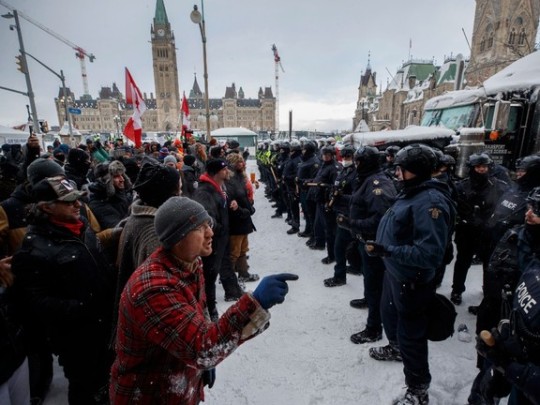
https://nationalpost.com/opinion/secret-rcmp-report-warns-canadians-may-revolt-once-they-realize-how-broke-they-are
Incase you guys haven't seen this.
“The coming period of recession will … accelerate the decline in living standards that the younger generations have already witnessed compared to earlier generations,” reads the report, entitled Whole-of-Government Five-Year Trends for Canada.
“For example, many Canadians under 35 are unlikely ever to be able to buy a place to live,” it adds.
The report, labelled secret, is intended as a piece of “special operational information” to be distributed only within the RCMP and among “decision-makers” in the federal government.
A heavily redacted version was made public as a result of an access to information request filed by Matt Malone, an assistant professor of law at British Columbia’s Thompson Rivers University, and an expert in government secrecy.
Describing itself in an introduction as a “scanning exercise,” the report is intended to highlight trends in both Canada and abroad “that could have a significant effect on the Canadian government and the RCMP.”
Right from the get-go, the report authors warn that whatever Canada’s current situation, it “will probably deteriorate further in the next five years.”
In addition to worsening living standards, the RCMP also warns of a future increasingly defined by unpredictable weather and seasonal catastrophes, such as wildfires and flooding. Most notably, report authors warn of Canada facing “increasing pressure to cede Arctic territory.”
Another major theme of the report is that Canadians are set to become increasingly disillusioned with their government, which authors mostly chalk up to “misinformation,” “conspiracy theories” and “paranoia.”
“Law enforcement should expect continuing social and political polarization fueled by misinformation campaigns and an increasing mistrust for all democratic institutions,” reads one of the report’s “overarching considerations.”
Ironically, among the report’s more heavily redacted sections is one carrying the subtitle “erosion of trust.” “The past seven years have seen marked social and political polarization in the Western world” reads a partial first sentence, with the entire rest of the section deleted by government censors.
The censor’s pen also deleted most of a section warning about “paranoid populism.” “Capitalizing on the rise of political polarization and conspiracy theories have been populists willing to tailor their messages to appeal to extremist movements,” reads the section’s one non-redacted sentence.
In terms of declining living standards and inaccessible home ownership, the RCMP’s warnings are indeed in line with available statistics.
Canadian productivity — measured in terms of GDP per capita — has been trending downwards since at least the 1980s. But this has accelerated dramatically in recent years — even as per-worker productivity rises in many of our peer countries.
An analysis last year by University of Calgary economist Trevor Tombe found that if Canada had merely kept pace with U.S. productivity growth for the last five years, Canadian per-capita earnings would be $5,500 higher than they are now.
Meanwhile, housing affordability has reached “worst-ever” levels in most of Canada’s major markets, according to a December analysis by RBC. On average, even condos are now so unaffordable that only 44.5 per cent of Canadian households had sufficient income to buy one at current prices. As for single-family homes, only the richest 25 per cent of Canadian households had any hope of obtaining one.
“Economic forecasts for the next five years and beyond are bleak,” reads the RCMP’s assessment of the rest of the decade, even adding a quote from French President Emmanuel Macron that “the end of abundance” is nigh.
30 notes
·
View notes
Text

@multiheaded1793 I think a useful comparison here is the US military and Blackwater (private military contractor). The US military is much worse on the net but Blackwater blows them out when it comes to doing awful shit per capita. Privatization reduces oversight, complicates the chain of command, and removes standardization of training (and subsequently behavior).
If you want to do a hard reset on your police force, just fire all of them and hire new cops (it's not actually this simple but it's still a lot better than privatization). I'd have to dig it up again but at least one city has done that and seen decent results.
The federal government can also union-break at will:

I also don't really understand your comment about a college degree as a class filter - that seems completely unrelated to the actual problems with police.
32 notes
·
View notes
Text
Atrocities US committed against PRISONERS
The US currently operates a system of slave labor camps, including at least 54 prison farms involved in agricultural slave labor. Outside of agricultural slavery, Federal Prison Industries operates a multi-billion dollar industry with ~ 52 prison factories , where prisoners produce furniture, clothing, circuit boards, products for the military, computer aided design services, call center support for private companies.
Ramping up since the 1980s, the term prison–industrial complex is used to attribute the rapid expansion of the US inmate population to the political influence of private prison companies and businesses that supply goods and services to government prison agencies. Such groups include corporations that contract prison labor, construction companies, surveillance technology vendors, companies that operate prison food services and medical facilities, private probation companies, lawyers, and lobby groups that represent them. Activist groups such as the National Organization for the Reform of Marijuana Laws (NORML) have argued that the prison-industrial complex is perpetuating a flawed belief that imprisonment is an effective solution to social problems such as homelessness, unemployment, drug addiction, mental illness, and illiteracy.
The War On Drugs, a policy of arrest and imprisonment targeting minorities, first initiated by Nixon, has over the years created a monstrous system of mass incarceration, resulting in the imprisonment of 1.5 million people each year, with the US having the most prisoners per capita of any nation. One in five black Americans will spend time behind bars due to drug laws. The war has created a permanent underclass of impoverished people who have few educational or job opportunities as a result of being punished for drug offenses, in a vicious cycle of oppression.
In the present day, ICE (U.S._Immigration_and_Customs_Enforcement), the police tasked with immigration enforcement, operates over 200 prison camps, housing over 31,000 undocumented people deemed “aliens”, 20,000 of which have no criminal convictions, in the US system of immigration detention. The camps include forced labor (often with contracts from private companies), poor conditions, lack of rights (since the undocumented aren’t considered citizens), and forced deportations, often splitting up families. Detainees are often held for a year without trial, with antiquated court procedures pushing back court dates for months, encouraging many to accept immediate deportation in the hopes of being able to return faster than the court can reach a decision, but forfeiting legal status, in a cruel system of coercion.
Over 90% of criminal trials in the US are settled not by a judge or jury, but with plea bargaining, a system where the defendant agrees to plead guilty in return for a concession from the prosecutor. It has been statistically shown to benefit prosecutors, who “throw the book” at defendants by presenting a slew of charges, manipulating their fear, who in turn accept a lesser charge, regardless of their innocence, in order to avoid a worst outcome. The number of potentially innocent prisoners coerced into accepting a guilty plea is impossible to calculate. Plea bargaining can present a dilemma to defense attorneys, in that they must choose between vigorously seeking a good deal for their present client, or maintaining a good relationship with the prosecutor for the sake of helping future clients.
European countries. John Langbein has equated plea bargaining to medieval torture: “There is, of course, a difference between having your limbs crushed if you refuse to confess, or suffering some extra years of imprisonment if you refuse to confess, but the difference is of degree, not kind. Plea bargaining, like torture, is coercive. Like the medieval Europeans, the Americans are now operating a procedural system that engages in condemnation without adjudication.”
A grand jury is a special legal proceeding in which a prosecutor may hold a trial before the real one, where ~20 jurors listen to evidence and decide whether criminal charges should be brought. Grand juries are rarely made up of a jury of the defendant’s peers, and defendants do not have the right to an attorney, making them essentially show-trials for the prosecution, who often find ways of using grand jury testimony to intimidate the accused, such as leaking stories about grand jury testimony to the media to defame the accused. In the murders of Michael Brown, Eric Garner, and Tamir Rice, all of whom were unarmed and killed by police in 2014, grand juries decided in all 3 cases not to pursue criminal trials against the officers. The US and Liberia are the only countries where grand juries are still legal.
The US system of bail (the practice of releasing suspects before their hearing for money paid to the court) has been criticized as monetizing justice, favoring rich, white collar suspects, over poorer people unable to pay for their release.
On Jan 26th, In Mississippi state penitentiary, an inmate was found hanging in his cell, in a string of deaths in the prison. This is the 12th death within a single month.
A photo surfaced of a November 2019 training class for prison guards in west virginia, showing 34 trainees doing a nazi salute. Only 3 people have been fired. A large number of prison workers, and populations in prison towns, are white supremacists.
A black-site interrogation warehouse in Chicago called Homan Square is notorious for the sexual abuse, torture, and disappearances of its prisoners. The main interrogator, Richard Zuley, applied torture techniques he learned at Guantanamo Bay at Homan Square.
On Oct 25, 2014, a mentally ill inmate, Michael Anthony Kerr, at the Alexander Correctional Institution in Taylorsville, NC, died of thirst after being denied water during a 35-day solitary confinement. Prison officials have said since Kerr’s death six months ago that they would investigate the events that led to his death, but no report has been issued and officials have not said when one would be.
On May 23rd, 2014, a mentally ill inmate at a Dade County correctional facility near Miami FL was tortured to death by prison guards. Darren Rainey was serving a two-year sentence for cocaine possession when he was forced into a locked shower by prison guards as punishment for defecating in his cell, says one inmate. Once Rainey was inside the shower, guards blasted him with scalding hot water as he begged for his life. Investigators determined that there was not enough evidence to charge the guards.
The Crime Bill of 1994, signed into law by Bill Clinton, increased the size of the US prison industry and dealt with the problem of crime by emphasizing punishment, not prevention. It extended the death penalty to a whole range of criminal offenses, and provided $30 billion for the building of new prisons, to crack down on “super predators”, a term used by Hillary Clinton to refer to remorseless juvenile criminals.
In the 1978 case, Houchins v. KQED, Inc. the Supreme Court ruled that the news media do not have guaranteed rights of access to jails and prisons. It ruled also that prison authorities could forbid inmates to speak to one another, assemble, or spread literature about the formation of a prisoners’ union.
In September 1971, prison guards killed George Jackson, a black Marxist and member of the Black Panthers in San Quentin prison (who had served 10 years of an indeterminate prison sentence for a $70 robbery), after he attempted to free himself and other inmates. Outrage over this, terrible prison conditions, and mistreatment by white prison guards, caused the Attica Prison Riot, in which 33 inmates and 10 prison guards were killed, and sparked dozens of prison riots across the country. In Attica, 100 percent of the guards were white, prisoners spent fourteen to sixteen hours a day in their cells, their mail was read, their reading material restricted, their visits from families were conducted through a mesh screen, their medical care disgraceful, 75% were there as a result of plea bargaining, and their parole system inequitable.
Many companies in the 1800s were guilty of using prison laborers, such as the Tennesee Coal Iron and Railroad Company. In 1891, the prison workers struck and overpowered the guards, and other neighboring unions came to their aid.
#us prisons#us politics#us president#us propaganda#us police#us papyrus#fuck cops#anti capitalism#socialism#anarchy#twitter x#communism#leftism#all cops are bastards#police violence#police state#fuck the police#policing#defund the police#cops#prison#inmate#prisoner#solitary confinement#convict#jail
31 notes
·
View notes
Text
One hundred years ago, the United States had a public transportation system that was the envy of the world. Today, outside a few major urban centers, it is barely on life support. Even in New York City, subway ridership is well below its 1946 peak. Annual per capita transit trips in the U.S. plummeted from 115.8 in 1950 to 36.1 in 1970, where they have roughly remained since, even as population has grown.
This has not happened in much of the rest of the world. While a decline in transit use in the face of fierce competition from the private automobile throughout the 20th century was inevitable, near-total collapse was not. At the turn of the 20th century, when transit companies’ only competition were the legs of a person or a horse, they worked reasonably well, even if they faced challenges. Once cars arrived, nearly every U.S. transit agency slashed service to cut costs, instead of improving service to stay competitive. This drove even more riders away, producing a vicious cycle that led to the point where today, few Americans with a viable alternative ride buses or trains.
Now, when the federal government steps in to provide funding, it is limited to big capital projects. (Under the Trump administration, even those funds are in question.) Operations—the actual running of buses and trains frequently enough to appeal to people with an alternative—are perpetually starved for cash. Even transit advocates have internalized the idea that transit cannot be successful outside the highest-density urban centers.
47 notes
·
View notes
Text
The Wall Street Journal recently reported on a confidential plan within the Trump campaign to erode the independence of the Federal Reserve by involving a re-elected President Trump in interest rate decisions. The news follows reports on other Trump plans to centralize and personalize power. As I argue in a new report, further democratic erosion in the United States would have serious economic consequences. Autocrats and populist leaders measurably damage their country’s economies, and certain businesses and sectors are at particularly high risk of interference. The economic value of liberal democracy is indisputable. Economists have found that countries with populist leaders, whether on the right or left, see a 10% decline in GDP per capita over the first 15 years. Democratization increases GDP growth per capita by 20% to 25% over the following decades.
As democracy declines, nearly all businesses will therefore face substantial costs. But certain sectors and industries that face especially high risks in conditions of democratic erosion. In many of these arenas, instances of interference have already occurred in the United States.
Businesses with high exposure to government decisions: Businesses that rely on government contracting or licensure, or that are exposed to audits or regulatory control, are particularly easy targets for would-be autocrats. For example, Viktor Orban used a license renewal process to pressure Hungary’s leading telecommunications company to shut down one of the most prominent independent news sites in Hungary.
Businesses reliant on public investments or public services: Businesses that use government data may find data less reliable if accurate data is perceived as damaging to the party in power. In India, interference with the release of economic data led leaders of the National Statistical Commission to resign in protest. Businesses that use public services may confront discrimination in access to those goods or a decline in quality due to disinvestment.
Businesses investing on a longer time horizon: Because of the policy instability that often accompanies democratic erosion, businesses that need to make long-term investments—for example, businesses that make difficult-to-move capital investments—are at particular risk.
Businesses reliant on a highly educated labor force: Brain drain is already an issue in many states. Younger workers with high levels of human capital tend to gravitate to places with strong public goods provision and take political environment into account in their job searches.
Businesses in media, entertainment, and communications: Control of public discourse is a key strategy for political leaders seeking to increase their power, and so would-be autocrats typically seek to dominate businesses in the media, entertainment, and communications sectors, including both the producers of media content and the owners of media channels and systems. In Brazil in 2021, then-President Jair Bolsonaro sought to prevent social media companies from taking down content that violated their rules.
Businesses in science, medicine, and education: Facts can endanger an autocratic regime, either by revealing government failures or by undermining the regime’s self-justifying mythos. Businesses in the realm of science, medicine, and education are therefore likely to receive high levels of scrutiny and efforts at control. In the one-party “Jim Crow” South, for example, leaders refused to collect data on the incidence of pellagra, a disease of malnutrition, because that data would reveal the depth of Southern poverty.
In-person businesses and businesses in tourism. Businesses that rely on customers showing up in person may see profit declines if an area experiences political or ethnic violence. The chilling effect can apply to whole neighborhoods, cities, and even states, as potential customers opt to avoid places that have developed a reputation for civil rights abuses, political instability, or political violence.
Unfortunately, it is not guaranteed that business leaders will recognize their economic interest in preserving democratic functioning. Historically, business leaders have often tragically misjudged the risks of supporting authoritarians. Business can play a crucial role in protecting democratic functioning; recognizing the dangers of democratic decline is a critical first step.
5 notes
·
View notes
Text
This day in history
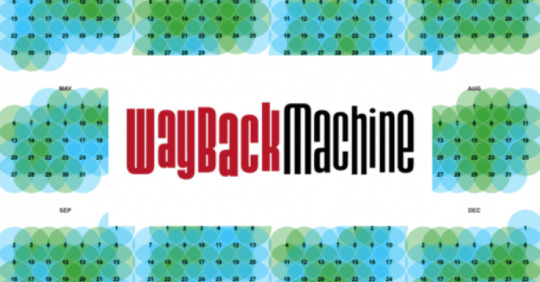
#20yrsago SCO sends IBM 1,000,000 pieces of paper https://memex.craphound.com/2003/12/10/sco-sends-ibm-1000000-pieces-of-paper/
#20yrsago Urban farmers reclaim Detroit https://www.nytimes.com/2003/12/04/garden/in-the-capital-of-the-car-nature-stakes-a-claim.html
#15yrsago What the hell is a Credit Default Swap? https://web.archive.org/web/20090421013937/https://www.thisamericanlife.org/radio_episode.aspx?episode=365
#15yrsago EFF (cautiously) optimistic at record labels’ offering of a blanket license to universities https://www.eff.org/deeplinks/2008/12/labels-open-collective-licensing-campus
#15yrsago Austin teacher threatens to sic cops on Linux group because “No software is free” https://web.archive.org/web/20081212115427/https://www.austinist.com/2008/12/10/aisd_teacher_throws_fit_over_studen.php
#10yrsago FreeBSD won’t use Intel & Via’s hardware random number generators, believes NSA has compromised them https://arstechnica.com/information-technology/2013/12/we-cannot-trust-intel-and-vias-chip-based-crypto-freebsd-developers-say/
#10yrsago UK kids have the right to opt out of school fingerprinting (even if their parents are OK with it) https://informationrightsandwrongs.com/2013/12/07/the-kids-all-have-rights/
#10yrsago Canada’s spooks were NSA bagmen, established spy-posts in 20+ countries and “transnational targets” https://www.cbc.ca/news/politics/snowden-document-shows-canada-set-up-spy-posts-for-nsa-1.2456886
#10yrsago Peak indifference to surveillance https://www.theguardian.com/technology/2013/dec/09/internet-surveillance-spying
#10yrsago Tech giants call for global surveillance law reform https://www.eff.org/deeplinks/2013/12/eight-tech-giants-call-reform-surveillance-law
#10yrsago Cyanogenmod adds encrypted SMS from WhisperSystems https://web.archive.org/web/20131211063720/http://www.cyanogenmod.org/blog/whisperpush-secure-messaging-integration
#10yrsago Life from the near future of location surveillance https://www.aclu.org/issues/privacy-technology/location-tracking/meet-jack?redirect=meet-jack-or-what-government-could-do-all-location-data
#5yrsago Syndicated columnist censored for writing about the risks of hedge funds and billionaires buying papers https://www.texasobserver.org/the-jim-hightower-column-they-dont-want-you-to-read/
#5yrsago Rhode Island lawsuit argues that the Constitution guarantees a right to sufficient education to be an informed citizen https://theconversation.com/fight-for-federal-right-to-education-takes-a-new-turn-108322
#5yrsago Costa Rica abolished its army in 1949 and thereafter enjoyed the best per-capita GDP growth in the region https://www.ippapublicpolicy.org/file/paper/594eced12c818.pdf
9 notes
·
View notes
Text
I got my new car today!!! I haven’t actually driven it yet. Because new things are scary for me and it takes me a little while to get used to something like driving a new car, I wanted to drive it around my parents’ a little before going in a busy road. Rob said it has “responsive break” and i wanna get that “feel” down before I’m in heavy traffic. I like it though and am very grateful and excited!!
Being at my parents’ hasn’t been too triggering this time around. Usually there are some kind of comments about my body or what I’m eating, but we have such a short turn around this year that thankfully it hasn’t been too bad…
Did have to listen to my mom talk about this guy who has multiple myeloma (my mom has a precursor to MM) and apparently is in “full remission” using an antiviral but it came back because he got the covid vaccine…. Tried to explain why that’s probably not true actually but you know… I think she just desperately wants there to be simple/easier answers to the cancer she might develop, which I get, but I also feel like this is how misinformation takes roots.
(We don’t have a perfect system here in the US by far, but we aren’t lagging behind in the cancer treatment realm…. If antivirals worked to cure MM, there would be research on it… and people would do it… contrary to popular belief, Big Pharma isn’t pushing ineffective expensive drugs to steal your money and keep you sick…drugs are ridiculously expensive, but it’s not malicious… insurance companies are far more malicious for refusing coverage than the pharma companies imo)
Also listening to some people talk about pot shop workers (specifically managerial roles) not deserving to be paid a certain amount, all the gender critical bs, like yall, I don’t like government regulations in general and I have my views on how we attempt legislating morality and why it doesn’t work, but like…… when you use that argument to justify why people who “don’t have any education and just know drugs” (not a real quote just a paraphase) don’t deserve to be paid a certain amount, AND you don’t use it to say that like, gov shouldn’t restrict access to health care like abortions and gender affirming care… that’s not “government shouldn’t legislate morality,” that’s “government should legislate the morality I agree with” which is… the same thing you’re complaining about the “other side” doing.
Especially the gender stuff. It takes very little actual energy to use somebody’s preferred, correct pronouns. Affirming care literally saves lives. When you spend a lot of energy and time lobbying against these things, it really just tells me how uncomfortable you are with the idea that somebody could have a different life experience than you. The only person who should be spending that much time and energy caring about those things… should be the person themselves. Partners or family ofc should care too, but in a “how do we support this person so they can live a fulfilling life” way, not in a “i can’t handle anybody having a different lived experience than me” kind of way.
And also if you’re gonna complain about federal spending and budgets, can you at least acknowledge the ridiculous defense budget? Even if your viewpoint is “I don’t know how we can realistically and safely scale that back,” just like… recognize how little the government actually spends on programs like VA health care in relation to the massive defense budget. We rank third in the world for per capita military spending… I’m not saying you need answers on how to solve anything, but if you’re gonna criticize the drops in the bucket, acknowledging that they are in fact drops in the bucket comparatively would be nice.
#political bs sorry#I’m grateful for my parents in so many ways#but it would be great if they could acknowledge their own biases#and also look at the actual data#like no you don’t care about the trans persons health#because if you did you’d realize that gender affirming care and BEING A KIND HUMAN is the most life sustaining thing you can do#lord forbid they ever find out I like neutral pronouns and hate the concept of gender all together#also like yeah a pot shop manager might not have advanced degrees#but that doesn’t mean they don’t deserve the same pay as managers in other retail fields???#so much work these days actually doesn’t require higher Ed#and not pursuing higher Ed doesn’t mean you’re incapable or contributing less to society#it’s giving ‘burger flippers dont deserve more than minimum wage because I don’t actually see them as valuable people’#call me radical but I’d like to see people who work full time regardless of industry be able to afford to live#I’m not saying push legislature through to ensure everybody is making enough to buy a 4 bed house in their own#just like maybe don’t talk about pot shop workers with disgust and vitriol#like the TONE man it’s the TONE
11 notes
·
View notes
Photo
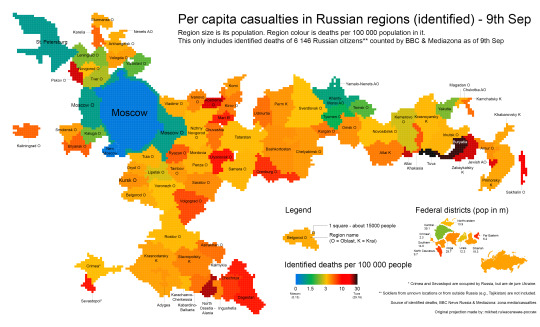
New map of dead soldiers per capita in Russian regions (identified deaths) - updated for September, based on BBC/Mediazona data.
by u/Humanophage
The map is based on identified dead Russian soldiers reported by BBC News Russia and Mediazona, based on finding their obituaries or other announcements about their deaths. There are currently over 6000 identified soldiers. Black and red means higher losses per population in a region, blue and green means lower losses. This is only a fraction of the total losses, but they should be representative because the identification is distributed randomly. I.e., it is unlikely that people from e.g. Moscow are less likely to have an obituary than someone from Altai.
Here is a similar map from May 10th: https://www.reddit.com/r/UkrainianConflict/comments/upg7fw/map_of_dead_soldiers_per_capita_in_russian/ , based on a similar procedure. Since the sample is about 3 times larger now, the scale categories are multiplied by 3 and rounded so the maps are comparable.
The biggest qualitative change happened in Chechnya, which went from the 80th to the 15th place. There is also a new leader, Tuva, which caught up with Buryatia. The casualties in Tuva and Buryatia are significantly higher than elsewhere. Far Eastern ethnically Russian regions used to have low casualties, but are now about average.
Moscow remains by far the lowest contributor at only 17 identified deaths, accounting for 0.3% of deaths despite comprising a little under 9% of Russia's population. St. Petersburg and Moscow Oblast (Moscow region) are also notably low, though not as much. Also low are the resource-rich areas like Tyumen Oblast and some historic Russian cores like Tver and Yaroslavl (but not others like Pskov).
Lowest per capita losses:
Khanty-Mansi AO - 1.12
Yamalo-Nenets AO - 1.09
Moscow Oblast - 0.98
Saint Petersburg - 0.91
Moscow - 0.13
Highest per capita losses:
Tuva Republic - 29.16
Buryatia Republic - 26.05
North-Ossetia - 16.71
Altai Republic - 14.89
Zabaykalsky Krai - 13.8
Federal districts:
Northwestern - 8% of the dead, 9% of total population
Central - 14% of the dead, 26% of total population
Southern - 11% of the dead, 9% of total population
Caucasus - 13% of the dead, 7% of total population
Volga - 23% of the dead, 20% of total population
Ural - 7% of the dead, 10% of total population
Siberian - 12% of the dead, 11% of total population
Far Eastern - 11% of the dead, 5% of total population
Crimea (occupied) - 2% of the dead, 2% of total population
71 notes
·
View notes
Text
Less than four years after George Floyd's murder sparked a mass awakening to the inequities of the criminal justice system, political leaders across the country are returning to a tough-on-crime approach. In some cases, voters and lawmakers are opting to reverse reforms passed years ago.
San Francisco voted Tuesday in support of two propositions that give more power to police and require addiction treatment as a condition for welfare assistance. D.C. Council members also passed a package of public safety measures Tuesday, including bringing back "drug-free zones."
The Tuesday votes follow movements to roll back reforms in Louisiana and Oregon.
"It's a stunning turnabout, especially so soon after the wave of national protests against the system for being too harsh," says Adam Gelb, President and CEO of the nonpartisan think tank Council on Criminal Justice.
Though the 50-year-pattern of reform and restrictions for may seem like we are headed back to highly punitive policies, Gelb said that isn't the full picture.
"I think there's very little chance that we return fully to the notion that we can arrest and punish our way to safety."
The Excerpt podcast: Crime stats show improvement. Why do so many believe it's never been worse?
Pendulum swinging across decades led to reforms during last 15 years
Gelb said the pattern like a pendulum swinging between restriction and reform starts as early as the 60s when a wave of reform led into a spike in crime in the 70s. The 80s brought in the crack crisis and a "get tough era," Gelb said. Over the next three decades, mandatory sentencing, a boom in prison development and harsher drug enforcement tactics led to a ballooning in the prison population.
During this time, the Violent Crime Control and Law Enforcement Act of 1994 was signed by President Bill Clinton, which The Brennan Center for Justice considers one of the most comprehensive federal bills on crime in history with a "complicated" legacy for its contributions to mass incarceration.
By 2007, one of every 31 adults was under the authority of the correctional system in the U.S., the country with the highest per capita incarceration rate in the world, according to a 2010 congressional report.
Efforts to reduce those populations had bipartisan support, as can be seen by the 2018 First Step Act to improve criminal justice outcomes while keeping crime low, which former President Donald Trump signed into law. But even before that, the Pew Trust reported that more than 30 states had passed laws to reduce the prison populations between 2007 and 2017. That included Louisiana.
Louisiana, Oregon repeal previous reforms, critics say ineffective in public safety
In an opinion piece in the Shreveport Times, part of the USA TODAY Network, Louisiana Gov. Jeff Landry explicitly blamed the Louisiana Justice Reinvestment Act signed by the former governor in 2017 for "rampant crime."
He kicked off a Legislative Special Session on crime, the Plaquemine Post South reported, including pushing through a measure that repealed a law passed in 2017 and now allows courts to prosecute 17-year-olds as young adults.
Landry signed 19 bills into law last week, including expanding methods of execution for the death penalty, reducing opportunities for parole and early release.
House Democratic Caucus Chairman Matthew Willard of New Orleans was critical of some of the moves, saying they will not do anything to stop crime before it happens. The ACLU of Louisiana testified against two of the bills on the grounds they were costly and not likely to reduce crime now.
Similar concerns were raised in Oregon, where the House passed a bill repealing part of Measure 110, a 2020 voter-approved measure to decriminalize drug possession. Critics of the new bill say the state's criminal justice system is already overwhelmed, and recriminalizing would disproportionally affect Black and Latino Oregonians, the Statesman Journal reported.
Tera Hurst, executive director of the Health Justice Recovery Alliance, also said it would be ineffective in helping alleviate crime rates today.
San Francisco, D.C. expand police powers by ballot and council
San Francisco voters showed great support on Super Tuesday for two measures put on the ballot by Democratic Mayor London Breed. She is up for reelection in November, with her opponents saying she has not been able to manage drug crimes, vandalism and theft, the Associated Press reported.
Proposition E grants police greater agency through less paperwork and wider drone use, according to AP. Propositions F requires adult welfare recipients who use drugs to receive treatment as a condition of receiving benefits, AP said.
D.C. Council members just passed an omnibus bill that brings together several public safety provisions raised over the last year. According to The Washington Post, the Secure D.C. Omnibus Amendment Act includes the following provisions:
Judges could more easily order some to be detained while awaiting trial for violent offenses
The definition of carjacking expanded to encompass more cases for prosecution
"Organized retail theft" considered a new felony
Establishing temporary "Drug-free zones", a 1990s-era tactic revived to address drug-related loitering
Democratic Mayor Muriel Bowser applauded the legislation in a statement Tuesday, saying "We will not tolerate violence and we will not tolerate criminal activity that disrupts our sense of safety and our ability to build thriving neighborhoods." The bill heads to her desk next before congressional review.
But the bills' passage drew a mixed reaction from the ACLU.
"While the amended Secure DC Act provides some limited safeguards, it falls short of keeping us safe from abuse of power," ACLU-D.C. Policy Counsel Melissa Wasser said in a statement.
'A ratchet, not a pendulum'
While national data on crime rates is notoriously difficult to track, statistics collected and analyzed from cities across the U.S. show a spike of violent offenses and drop in property crime during the pandemic. But that data, compiled by the CCJ, suggests that most types of crime are reverting back towards pre-pandemic levels.
Gelb said the goal should actually be the recent lows in 2014, before the death of Michael Brown in Ferguson, Missouri further ruptured public trust in police.
He also acknowledged that some policies that have popped up recently may be intended to send a message about crime tolerance rather than stop crime directly, noting that downward trends might not necessarily make people feel safe.
"I think this is much more about quality than quantity," Gelb said. "Most people aren't fluent in the statistics, but they know what they see and hear on the street, from friends and social media. And it's the randomness, the brazenness of some of these some of these incidents that suggests a culture of lawlessness, a breakdown of behavioral norms and social standards."
Gelb also says that even though this wave of tough-on-crime laws may seem like that pendulum is headed back to that era, he doesn't think it will be that extreme.
"It is a ratchet. It's not a pendulum," Gelb said. "They're not going back to the way it was before. They're shaving off the most aggressive edges and dialing things back rather than completely rejecting a balanced approach."
4 notes
·
View notes
Text
Marching towards what solution?
Steve Freeman gives a Menshevik twist to the old PLO demand for a single capitalist Palestinian state by making the case for a single capitalist federal republic. The perspective of working class rule and socialism is denounced as ultra-leftism
#communism#socialism#marxism#leftism#leftist#leftist politics#leftists#workers#working class#workers rights#workers power#workers control#soviet power#soviet control#palestine#free palestine#from the river to the sea#plo#fatah#pflp#marx#marxist#karl marx#lenin#leninist#leninism#vladimir lenin#bolshevik#bolshevism
2 notes
·
View notes
Text
April 11, 2024
Mr. Bouchard: For much of our recent history Alberta has paid far more in federal taxes than we get back in programs or transfers. Even during the last economic downturn we were the largest net contributor to federal finances, yet we consistently receive less than our provincial neighbours in per capita funding. When we do receive funding, those federal dollars come with ideological strings attached, offering funding on its own terms, bypassing the provinces and forcing municipalities to dance to Ottawa’s tune. In other cases Ottawa ignores programs already in place and wastefully spends on identical programs like pharmacare and dental care when what we really need is envelope funding to expand existing provincial programs in these areas.
#oh yeah i love my alberta pharmacare and dental care#oh wait that doesn't exist#alberta#alberta politics#ableg#Eric Bouchard#Calgary-Lougheed#UCP#cdnpoli
2 notes
·
View notes
Text
MY TRAVEL LIST
Italy- is a south-central European country, whose boot-shaped borders extend into the Mediterranean Sea. The country’s historical cities, world-renowned cuisine and geographic beauty make it a popular destination for more than 40 million tourists each year.
Switzerland-is a federal republic made up of 26 cantons and an administrative capital in Bern. Most of its citizens live in towns and cities, the most populous of which is Zurich– the most cosmopolitan of the country’s cities. The country prides itself on its diversity, and is home to regions with distinct cultural identities. German, French, Italian and Romansh languages all enjoy national status.
New Zealand-saw impressive growth and transformation in the decades following independence. The export market, abounding with dairy, sheep, beef, poultry, fruit, vegetables and wine, was opened beyond the U.K., and manufacturing and tourism were expanded. Per capita income remains high and education expenditures as a percent of gross domestic product are some of the highest in the world.
Japan-one of the world’s most literate and technically advanced nations, is an East Asian archipelago country made up of four primary islands and more than 6,800 others. While most of Japan is covered by mountains and heavily wooded areas, the country’s people lead a distinctly urban lifestyle. Long culturally influenced by its neighbors, today the country blends its ancient traditions with aspects of Western life.
Canada-takes up about two-fifths of the North American continent, making it the second-largest country in the world after Russia. The country is sparsely populated, with most of its residents living within 125 miles of its border with the United States. Canada’s expansive wilderness to the north plays a large role in Canadian identity, as does the country’s reputation of welcoming immigrants.
THAT'S ALL I LISTED BECAUSE IM NOT SURE ABOUT THE OTHER COUNTY, MAYBE SOON WHEN I'M OLD ENOUGH, I CAN TRAVEL THE WHOLE WORLD WITH MY HONEYBUNCH<3
3 notes
·
View notes